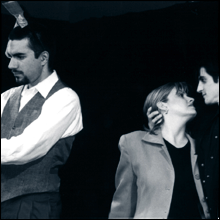![[Sidebar]](/standard/image/sidebar.gif)
![[Theater]](/standard/image/headers/theater_header.gif)
| hot links | listings | reviews |
Potent playlets
2nd Story's sharp Short smorgasbord
by Bill Rodriguez
SHORT ATTENTION SPAN THEATRE. Six short one-act plays by Christopher Durang and David Ives. Directed by Pat Hegnauer. Presented by 2nd Story Theatre at St. Andrew's School, Barrington, through March 13.
Variations on the Death of Trotsky
For the second production of her newly resurrected 2nd Story Theatre, artistic director Pat Hegnauer figured what the hell, you can't have too much of a good thing. She loves the wry and clever theatrical morsels of playwright David Ives, audiences get a kick out of them, so this evening of Short Attention Span Theatre is smorgasbord.There are five of his mini-plays, 10 to 15 or so minutes in length, prefaced by a Christopher Durang introductory sketch. Durang is the darkly comic playwright who gave us Sister Mary Ignatius Explains It All to You. The parochial-school-scarred lad offers us another middle-aged woman revealing more in her instructions than she realizes, in Mrs. Sorken. The title character (Enedina Garcia) has the task of speaking to us about the appeal of theater, before whatever performance it is we are about to see. The poor woman has left her notes at home, but that doesn't slow her down. Her task was mainly to delve into the origins of such words as drama, and between what she half remembers and what she bluffs, she enlightens in spite of herself. Drama, we learn, is related to the sea sickness drug Dramamine and was designed "to cure us of the nausea of life." Her particular queasiness involves not only the fuddy-duddy Mr. Sorken but also the plays of Shakespeare "when it's hot and I have to pay," as opposed to those cool summer evening freebies in the park.
The next piece puts Ives, director Hegnauer and the evening's acting quality on fine and delightful display. Sure Thing explores variations on the most common theme of such short two-person plays, the pick-up. It's kind of a multiple alternate universe depiction of variations on a situation. Betty (Alyn Carlson-Webster) is sitting in some public place, reading The Sound and the Fury and, at first, rejecting a hopeful Bill (Dave Rabinow) in all his possible off-putting permutations. Hasn't read it. Read it but hates Faulkner. Hates her precious Woody Allen films. Loves Woody's flicks but not her favorite early slapshtick. Ding! goes an off-stage bell each instant things turn from hopeful to fuggedaboudit, and the encounters are increasingly longer before the inevitable wince. Sic semper amorous.
Two pieces follow that similarly spin variations on reality. In English Made Simple, Jack (Steve Palmer) and Jill (Margarita, no last name) demonstrate how "the first three minutes of a conversation between strangers can determine a relationship for eternity." We get simultaneous translations of the highly charged purr talk that leads to either a "dead-end or bliss." Next, the exquisitely absurd Variations on the Death of Trotsky is based on the fact that the assassinated Russian revolutionary (Rabinow) lived for a day after a mountaineering axe found its way into his skull. Even with an axe sticking out of his head, the Great Man gets no respect from the missus (Rae Mancini). "Maybe he just wanted to pick your brains," one version of her titters.
My favorite is the silliest of all. In The Philadelphia, Mark (John Capalbo) finds that he is in a black hole of reality in which he can get nothing he asks for. Pharmacies don't have aspirin. Diners don't have coffee. His friend Al (Palmer) informs him that his Existential state was named after the home of the Philly cheese steak, a combination "that no one would willingly ask for." Until the end, Al is chipper about his pal's plight, even about losing his job. After all, he's been in a Los Angeles all day.
Hegnauer leaves us with a "What the heck was that?" piece, a classification the program proudly defines. Philip Glass Buys a Loaf of Bread is a hilarious send-up of the composer's minimalist music, and Robert Wilson's surreal accompanying theater pieces, applied to ordinary life. Philip Glass (Capalbo) enters a bakery (in slow motion) passing two women, one of whom (Mancini) is a former lover. A handful of lines ("Isn't that Philip Glass?," "I think it is," "I'd like a loaf of bread"), fragments of them, and accompanying actions, repeat. And repeat. It's funny visually, conceptually, and in the new meanings all the cutting and pasting create.
Such playlettes, especially if they're as intelligent as these by Ives, can be the Altoids of theater. Tiny but curiously strong, concentrating a whole act's payoff into one brief scene. And nobody around here picks 'em or directs 'em as skillfully as Hegnauer at 2nd Story.
![[Footer]](/standard/image/footers/theater_footer.gif)
| home page | what's new | search | about the phoenix | feedback |
Copyright © 1998 The Phoenix Media/Communications Group. All rights reserved.
